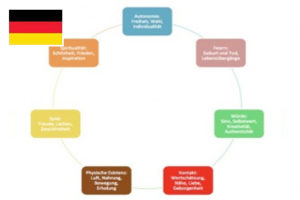
 Was das Leben sinnvoll macht: Bedürfnisse achten-Werte schätzen Teil 4
Was das Leben sinnvoll macht: Bedürfnisse achten-Werte schätzen Teil 4Grundbedürfnisse 4: Marschall B. Rosenberg
Marshall B. Rosenberg (*1934 in Ohio) ist Gründer und Direktor des gemeinnützigen Center for Nonviolent Communication. Er hat das Konzept der Gewaltfreien Kommunikation entwickelt. Beeinflusst wurde seine Arbeit u. a. von der klientenzentrierten Gesprächs- therapie seines Lehrers Carl Rogers (Humanistische Psychologie) und Überlegungen Mahatma Gandhis zur Gewaltfreiheit. Nach Rosenberg gibt es auf der Ebene der Grundbedürfnisse keine Konflikte zwischen Menschen. Denn diese Grundbedürfnisse sind allen Menschen zu eigen. Konflikte entstehen erst zwischen den unterschiedlichen Strategien, mit denen Menschen ihre Bedürfnisse zu erfüllen versuchen.
Vgl. Rosenberg, Marshall B. (2005): Gewaltfreie Kommunikation. Eine Sprache des Lebens; gestalten Sie Ihr Leben, Ihre Beziehungen und Ihre Welt in Übereinstimmung mit Ihren Werten. Paderborn: Junfermann Verlag, S. 216-217
4) Günter W. Remmert: http://www.seminarhaus-schmiede.de/pdf/wertelust.pd4
Prof. C.J.M. Beniers
Email: beniers@mac.com
08-01-2016
About Professor C.J.M. Beniers
Prof. C.J.M. Beniers is a well known authority in the field of modern and international communication techniques. He developed the Six-Component-Model. This model enables companies, institutions and politicians to communicate and negotiate with counterparts from all over the world successfully. His career began as international manager at Philips and later he earned his doctorate as professor in communication. He has more than 35 years experience as manager and management trainer. Thus he knows both sides – theory and praxis – very well. As scientist, Prof. Beniers conducts frequently research in the field of intercultural communication. The results of his interesting research can be found in news articles, free pod casts, audio books and his E-books such as “Bridging The Cultural Gap.” Here, modern managers learn how to prepare for business meetings with people from different cultures; they acquire the techniques and tools to handle situations in times of crises successfully, master intercultural barriers, country-specific communication patterns, looking into personal cultural values & systems. Knowing all this, men can prevent cultural misunderstandings and misinterpretations – not only in business but also in private life.